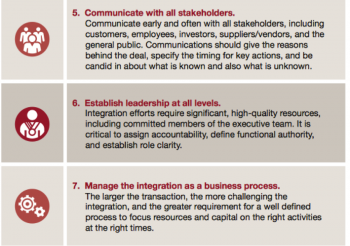It has become the norm for businesses to incorporate a virtual workforce into their operations.
Whether a company has geographically dispersed offices, hires employees or freelancers in different cities or countries, or just offers local employees the flexibility to work from home, more and more of us are having to manage remote teams.
Results of a Gallup survey published earlier this year showed that 43 percent of employed Americans spent at least some time working remotely in 2016.
Insights: Accountability
The Volkswagen emissions scandal figures prominently in the Catalog of Catastrophe that the International Project Leadership Academy has compiled of the most spectacular project management failures in the last 10 years.
The revelation that such a revered and trusted brand had taken previously inconceivable steps to deceive both regulators and the public in the name of profit margins was a shock to the world.
The worldwide cyberattacks in the news lately have worried businesses and individuals alike.
The ransomware attacks Petya and WannaCry have affected commercial businesses, governmental entities, and individuals by the thousands. But while the media focuses on these external attacks, internal network security threats remain one of the most common problems in security management.
Setting up a project management office is one the most effective things you can do to manage multiple projects around your organization. But it could become a big waste of time and resources if not configured properly.
In the wake of the UK Parliament’s recent network security attack, it’s clear that no matter how well-designed our IT security systems and internal controls are, there’s always a risk of your organization falling victim to a cyber threat.
Last week’s announcement that Amazon plans to acquire Whole Foods for 13.7 billion dollars is a big deal. It’s a big deal on Wall Street (It is Amazon’s biggest acquisition so far and the largest ever merger/acquisition of a US grocery store chain.) And it’s a big deal on Main Street –potentially changing the way American’s buy food in a fundamental way.
The latest data out from the Bureau of Labor Statistics shows that the unemployment rate is at it’s lowest point since the recession and that the labor market is verging on full capacity.
While this is good news for the US economy, it means that you, as an employer, cannot afford to lose even one valuable employee. Turnover is expensive.
We are almost halfway through 2017, and, as expected, it is proving to be another challenging year for the HR professional.
Unemployment continues to fall, shrinking the pool of talent. Social changes have had a profound effect on the new generation of workers and what they expect from their employer. And the recent political turnover is creating a whirlwind of changes in government regulation.
HR compliance is no longer a simple, straightforward process.
It’s no surprise that the San Francisco transportation company is currently going through a much needed cultural change following a tough year in the press. But the questions on all our minds are, what will it take to really change Uber’s culture, and will Uber succeed?
When a company is charged with financial statement fraud, the first question asked is “Where were the auditors?”
But auditors can only insure accurate financial reports in a robust business environment where every stakeholder has bought into the importance of internal control procedures and their documentation.
Creating an internal control integrated framework over subjective and complex accounting areas such as revenue recognition, loan impairment and valuation is especially challenging, and insufficient internal control procedures can leave an organization dangerously open to fraudulent financial reporting.





